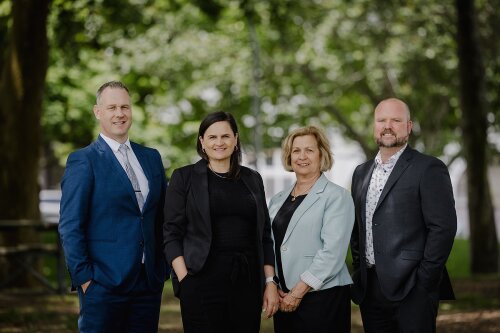Best Communications & Media Law Lawyers in Cambridge
Share your needs with us, get contacted by law firms.
Free. Takes 2 min.
List of the best lawyers in Cambridge, New Zealand
1. About Communications & Media Law in Cambridge, New Zealand
In Cambridge, New Zealand, Communications and Media Law encompasses the rules governing how information is collected, shared, and protected. It also covers how media content is produced, distributed, and regulated. Local residents and businesses rely on national statutes and court decisions rather than Cambridge specific laws for these matters.
Key areas include privacy, defamation, broadcasting standards, copyright, and online safety. Enforcement is carried out by national agencies and the courts, with local councils applying public information requirements where relevant. A Cambridge solicitor or media lawyer can help interpret how these rules apply to your situation and represent you in disputes or enforcement actions.
Because the laws are national, staying informed about changes at the New Zealand level is important for Cambridge residents. The core bodies involved include the Office of the Privacy Commissioner, the Broadcasting Standards Authority, and the Classification Office, all of which publish guidance and decisions that affect local media activities. This guide highlights practical implications for people living in Cambridge and nearby towns in the Waikato region.
2. Why You May Need a Lawyer
-
Defamation risk from a Cambridge press release. If a local business or community group publishes statements about a person or business, you may face defamation claims. A solicitor can assess risk, help modify wording, and advise on settlement or court actions if needed. They can also help with cease and desist communications if false statements have been published.
-
Online harassment or harmful content involving a Cambridge resident. If you or a family member experiences digital abuse, the Harmful Digital Communications Act 2015 may apply. A legal professional can explain remedies, assist with reporting to authorities, and pursue civil remedies where appropriate.
-
A data breach or privacy concern in a Cambridge business. The Privacy Act 2020 imposes notification duties and information privacy principles. A lawyer can guide you through breach response, notification timelines, and any regulatory inquiries or penalties.
-
Media licensing or content classification for a Cambridge project. If you plan to publish or broadcast material, you may need to consider classification rules and licensing requirements under the Films, Videos, and Publications Classification Act 1993. A lawyer can help with risk assessment, licensing, and compliance strategies.
-
Copyright clearance for local marketing or publications. Using images, music, or video in Cambridge requires proper licenses and rights clearance. A solicitor can draft permissions, advise on fair dealing, and handle infringement discussions with rights holders.
-
Defence in a government or court proceeding involving media or communications. If you are involved in a dispute that touches on broadcast standards, privacy, or defamation, a Cambridge solicitor can provide skilled litigation or negotiation representation and help you understand potential outcomes and costs.
3. Local Laws Overview
Cambridge residents are subject to New Zealand national legislation governing communications and media matters. The following acts are central to most Cambridge cases in this field. Each act has official text and explanatory guidance available from government sources.
- Privacy Act 2020 - This act governs how organisations handle personal information and introduces breach notification obligations. It applies to private companies, government agencies, and individuals who collect or process personal data. The act came into force in 2020, with ongoing guidance from the Office of the Privacy Commissioner. Legislation NZ - Privacy Act 2020
- Harmful Digital Communications Act 2015 - This act targets harmful online communications and provides remedies for victims as well as offences for certain offenders. It covers digital messages, social media, and other online platforms. Legislation NZ - Harmful Digital Communications Act 2015
- Films, Videos, and Publications Classification Act 1993 - This act governs the classification, censorship, and disclosure of films and publications. It affects media producers, distributors, and distributors of printed material in New Zealand. Legislation NZ - Films, Videos, and Publications Classification Act 1993
Recent regulatory trends in New Zealand emphasize online safety, privacy protection, and transparent media practices. For Cambridge residents, this means staying current with not only the letter of the law but also government guidance on how to comply in everyday media activities. Government and agency sites linked above provide official updates and practical guidance.
4. Frequently Asked Questions
What is the difference between a solicitor and a barrister?
A solicitor handles most legal work outside court and prepares documents. A barrister represents clients in court if a matter goes to trial. In Cambridge, many law firms offer both services, or work with a barrister when court appearances are needed.
What is the Privacy Act 2020 about?
The Privacy Act 2020 regulates how organisations collect, store, use and disclose personal information. It includes mandatory breach notification and information privacy principles for responsible handling of data.
How do I report harmful online content in Cambridge?
You can contact the relevant platform and, in serious cases, the Police. Remedies under the Harmful Digital Communications Act 2015 may include civil actions, orders, and potential penalties.
How much does hiring a media lawyer cost in Cambridge?
Costs depend on the matter's complexity and the firm. Fixed-fee consultations are common for initial advice, with hourly rates varying by firm size and experience.
How long does a defamation case typically take in New Zealand?
Defamation timelines vary widely by case. Some disputes settle quickly, while others proceed to trial and can take many months or longer, depending on evidence and court availability.
Do I need a Cambridge-based solicitor or can I use a national firm?
You can use either. A local Cambridge solicitor offers face-to-face access and familiarity with local stakeholders. A national firm can provide broader resources and expertise.
What steps are required to obtain a media license?
Broadcasting and media licenses are regulated nationally. A solicitor can help determine if you require a license or regulatory approval and guide you through the application process.
Is a complaint to the Broadcasting Standards Authority necessary?
If your issue concerns broadcast content, the BSA is the proper body to file a complaint about codes of practice and media standards. They publish decisions that set precedents for similar cases.
What should I know about copyright when using third-party content?
Using someone else’s images, music, or video typically requires a license or permission. A lawyer can help with licensing agreements and identify fair dealing or statutory exemptions where applicable.
When should I consult a media lawyer for defamation risk?
Consult early if you plan to publish potentially harmful statements about a person or business. Early advice can help minimize legal exposure and adjust content accordingly.
What is the timeline for resolving a privacy breach claim?
Timelines depend on the severity of the breach and regulator involvement. Notifiable breaches require prompt action, with formal processes following within weeks to months depending on complexity.
Can I sue for online harassment under HDCA?
Yes, the Harmful Digital Communications Act provides avenues for civil remedies in online harassment cases, alongside potential criminal offences for certain actors.
5. Additional Resources
-
Office of the Privacy Commissioner - Enforces privacy laws, handles complaints about personal information handling, and provides guidance for individuals and organisations. privacy.org.nz
-
Broadcasting Standards Authority - Oversees codes of broadcasting practice and handles complaints about broadcast content. bsa.govt.nz
For classification and content suitability, see the Office of Film and Literature Classification guidance.
-
Office of Film and Literature Classification - Administers classification decisions for films and publications under the Classification Act. classificationoffice.govt.nz
-
Intellectual Property Office of New Zealand - Handles copyright, trademarks, and other IP rights in New Zealand. iponz.govt.nz
6. Next Steps
-
Define your issue and objectives clearly. Write a one-page summary including key dates, parties involved, and desired outcomes. Do this within 3 days of discovering the issue.
-
Identify Cambridge-based and NZ-wide solicitors with media law experience. Request written proposals and check recent case outcomes. Allocate 1-2 weeks for this step.
-
Schedule initial consultations with 2-3 shortlisted firms. Prepare documents such as contracts, emails, or screenshots. Allow 1-2 weeks for consultations and comparison.
-
Obtain engagement terms and a retainer. Confirm costs, timelines, and communications expectations. This typically occurs within 1 week after the final consultation.
-
Develop a strategy with your attorney. Create a timeline for milestones, potential settlement options, or court dates. Expect a multi-week planning phase for complex matters.
-
Proceed with the agreed plan and maintain regular updates. Review documents, responses, and decisions at each milestone. Timeline varies by issue but plan for monthly reviews for ongoing work.
-
Reassess after the initial phase. If needed, adjust the strategy in light of new evidence or regulatory developments. This helps manage costs and outcomes.
Lawzana helps you find the best lawyers and law firms in Cambridge through a curated and pre-screened list of qualified legal professionals. Our platform offers rankings and detailed profiles of attorneys and law firms, allowing you to compare based on practice areas, including Communications & Media Law, experience, and client feedback.
Each profile includes a description of the firm's areas of practice, client reviews, team members and partners, year of establishment, spoken languages, office locations, contact information, social media presence, and any published articles or resources. Most firms on our platform speak English and are experienced in both local and international legal matters.
Get a quote from top-rated law firms in Cambridge, New Zealand — quickly, securely, and without unnecessary hassle.
Disclaimer:
The information provided on this page is for general informational purposes only and does not constitute legal advice. While we strive to ensure the accuracy and relevance of the content, legal information may change over time, and interpretations of the law can vary. You should always consult with a qualified legal professional for advice specific to your situation.
We disclaim all liability for actions taken or not taken based on the content of this page. If you believe any information is incorrect or outdated, please contact us, and we will review and update it where appropriate.










